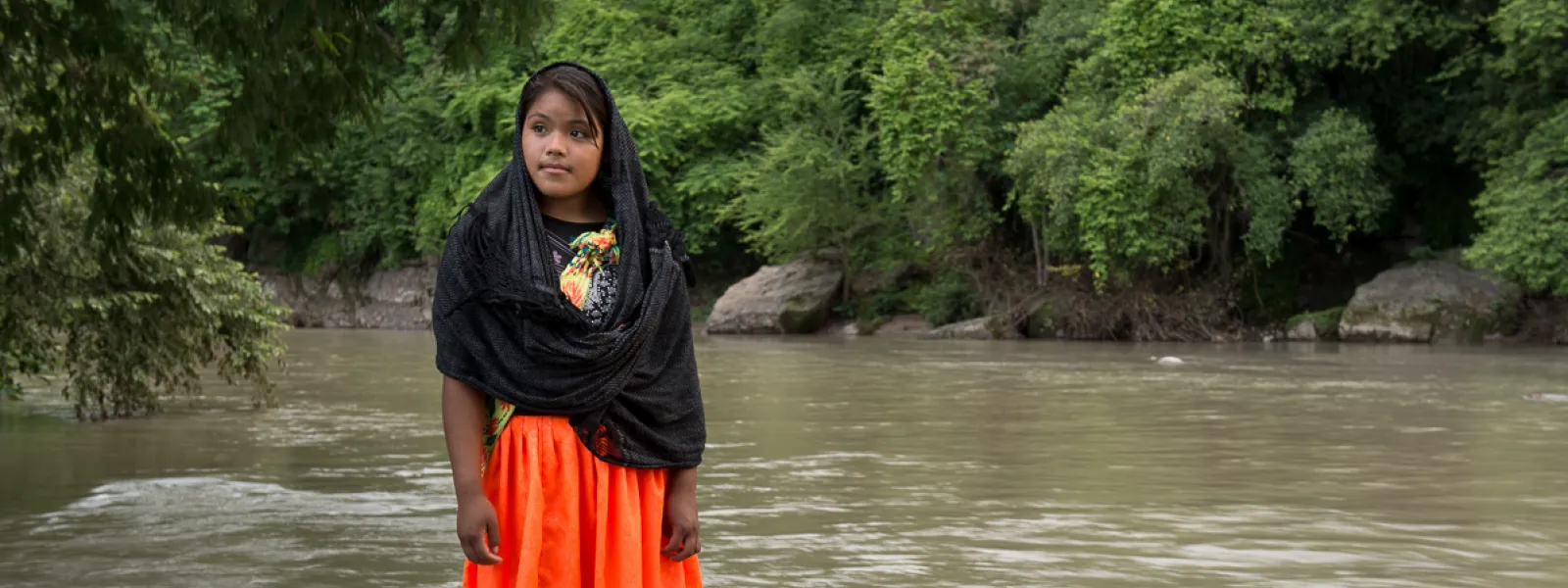
Project
Photo: Jaime RojoSaving the San Pedro Mezquital River from a destructive large dam
If built, the Las Cruces Dam would block the San Pedro Mezquital, the last free-flowing river in Mexico’s western Sierra Madre. It would affect fisheries, agriculture, livestock and other activities that nearly 12,000 families depend upon for survival.
The reservoir would flood the village of San Blasito and impact the town of Saycota. It would destroy an indigenous ceremonial center and 14 sacred sites. And it would restrict the water and nutrients that the river carries to Marismas Nacionales—the National Wetlands—which harbors one of the largest mangrove forests in Mexico.
In September 2014, the Mexican government approved the dam, despite the environmental impacts and without consulting and obtaining consent from affected indigenous communities.
The authorization ignored the technical opinions of national authorities, as well as recommendations from international organizations about the threats the project poses to the environment and human rights.
AIDA is working hand-in-hand with local organizations to support the communities affected by the project in their fight to have their rights respected.
Partners:
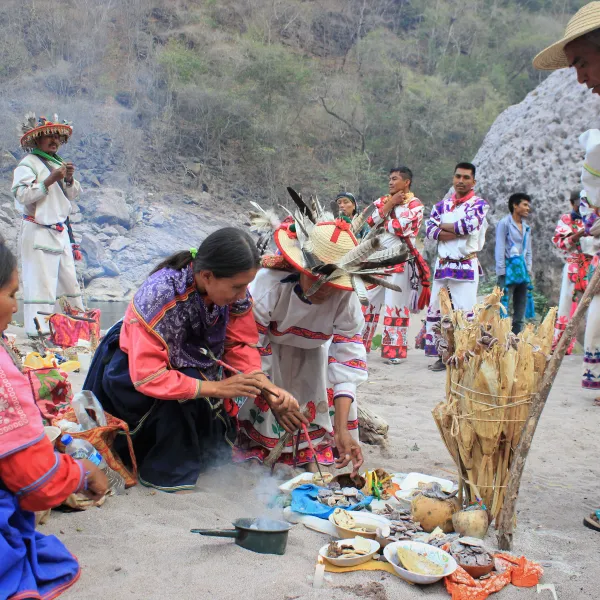
Related projects
Latest News
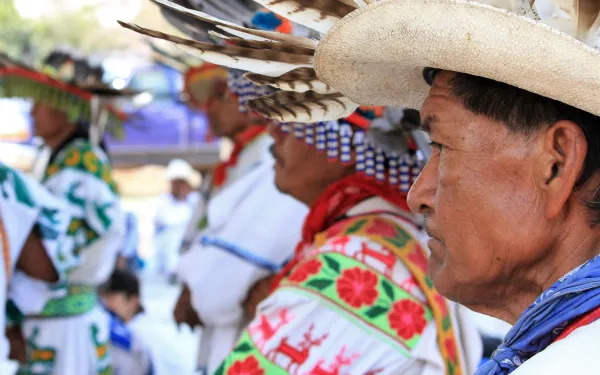
Civil society urges the United Nations to document human rights violations committed by businesses in Mexico
A group of organizations delivered their report highlighting more than 60 cases of violations across the country. Mining, infrastructure and energy projects—including hydroelectric and wind—were responsible for the greatest number of human rights violations. Mexico City, Mexico. On the occasion of the United Nations Working Group on Business and Human Rights’ official visit to Mexico, a coalition of more than 100 civil society organizations, movements and networks prepared a report outlining cases of human rights violations perpetrated by corporations in Mexico. The report highlights Mexico’s current human rights crisis, which has been recognized by various UN agencies[1] and the Inter-American Commission on Human Rights.[2] It lays out the clear dangers facing those who protect human rights, the land and their own territory.[3] Documented cases of human rights abuses involve 50 foreign, 41 national, and eight public companies. More than half the cases involved intimidation and/or attacks against human rights defenders. The most frequent violations were to the rights to: land and territory; access to information; health; a healthy environment; and consultation and free, prior and informed consent. During the Working Group’s regional visits, affected communities will show the experts the negative impacts caused by companies linked to mining, wind power, hydroelectric dams, agribusiness, infrastructure, oil and gas exploitation, real estate, tourism and maquilas (manufacturing facilities), among others. At the suggestion of civil society, the Working Group will meet with companies including: Grupo México, Grupo Higa, Grupo BAL, Bimbo, Goldcorp, TransCanada, Eólica del Sur, and CEMEX. They will also meet with the state-run production companies, Petróleos Mexicanos (Pemex) and the Federal Electricity Commission (CFE). Situations in Mexico that systematically hinder compliance with the UN Guiding Principles on Business and Human Rights include: State Capture: complicity, corruption and impunity. In many documented cases, the Mexican State, at all levels (federal, state and municipal), has served business interests above public interest. This has been evident in: the promotion of rules and regulations that benefit business interests over human rights; the use of public force against peaceful social mobilization; the support of extractive projects against community interests; the lack of inquiry and sanction by the judiciary regarding allegations of human rights abuses; and the criminalization of environmental advocates. Structural reforms that weaken the protection of human rights and support companies, such as the energy reform, which does not always consider its impacts on human rights, and does not guarantee the participation and right of access to information of affected communities. Lack of consultation and the free, prior, informed, culturally appropriate, and in good faith consent of affected communities; lack of due diligence on the part of companies; and the proliferation of megaprojects with severe impacts on human rights. Lack of access to justice and non-compliance with rules and judgments, by companies as well as the Mexican State. On multiple occasions, affected people who have reported rights violations have later been the victim of attacks. And, even if a court—including the Mexican Supreme Court— ruled in their favor, the fulfillment of that ruling was not observed. Reduction of participation mechanisms and an increase in abuses against human rights defenders. The cases illustrate an increase in murders, criminalization, threats and attacks on human rights defenders who have spoken out against mega-projects and business activities. In 2011, the United Nations Human Rights Council issued the "Guiding Principles on Business and Human Rights" in order to empower States to exercise control over business activities, ensure due diligence, and guarantee access to effective and appropriate remedial measures. In order to monitor the application of these principles, the Council established the Working Group on Business and Human Rights, whose visit Mexico from August 29th to September 7th 2016 will be their second visit to Latin America. On behalf of the organizations and communities that prepared this report, we hope that the conclusions reached by the Working Group at the close of their visit will reflect what Mexico truly needs. We urge companies operating in Mexico, as well as the Mexican State, to consider the recommendations seriously and implement them in current and future operations. For more information in social media, following along: #ONUenMX The report was created with the participation of the following organizations and human rights groups (in alphabetical order): Alianza de la Costa Verde Ambiente y Desarrollo Humano Asociación Interamericana para la Defensa del Ambiente (AIDA) Bios Iguana Campaña Nacional Sin Maíz No Hay País Cartocrítica Casa del Migrante Saltillo Centro de Derechos Humanos “Fray Bartolomé de Las Casas” Centro de Derechos Humanos “Fray Francisco de Vitoria” Centro de Derechos Humanos “Miguel Agustín Pro Juárez” (Centro Prodh) Centro de Derechos Humanos de la Montaña, Tlachinollan Centro de Derechos Humanos Toaltepeyolo Centro de Derechos Humanos Zeferino Ladrillero (CDHZL) Centro “Fray Julián Garcés” Derechos Humanos Centro de Información sobre Empresas y Derechos Humanos (CIEDH) Centro de Reflexión y Acción Laboral (CEREAL) Centro Diocesano para los Derechos Humanos “Fray Juan de Larios” Centro Mexicano de Derecho Ambiental (CEMDA) Colectivo sí a la vida No al basurero tóxico en Noria de la Sabina Comités de Cuenca Río Sonora (CCRS) Comité de Defensa Integral de Derechos Humanos Gobixha (CODIGODH) Comité de Derechos Humanos de Tabasco (CODEHUTAB) Comisión Mexicana para la Defensa y Promoción de los Derechos Humanos (CMDPDH) Consejo en Defensa de la Vida y el Territorio TiyatTlali DECA Equipo Pueblo DH Rayoactivo El Barzón Chihuahua EcoRed Feminista la Lechuza Buza Enfoque DH Estancia del Migrante en Querétaro Frente de Pueblos en Defensa de la Tierra y el Agua (FPDTA) Fundar, Centro de Análisis e Investigación Foro de Derechos Humanos y Resistencias de la Sierra de Puebla Greenpeace México Grupo de Estudios Ambientales Grupo Focal sobre Empresas y Derechos Humanos Indignación, Promoción y Defensa de los Derechos Humanos Instituto Mexicano para el Desarrollo Comunitario (IMDEC) Movimiento Ciudadano en Defensa de la Loma Movimiento Mexicano de Afectados por las Presas y en Defensa de los Ríos (MAPDER) Movimiento Mesoamericano contra el Modelo Extractivo Minero (M4) OrganicConsumersAssociation (México) Oxfam México Programa Universitario de Derechos Humanos, Programa de Incidencia, Programa de Medio Ambiente, UIA Proyecto de Derechos Económicos, Sociales y Culturales (ProDESC) Proyecto sobre Organización, Desarrollo, Educación e Investigación (PODER) Red Mexicana de Afectados por la Minería (REMA) Semillas de Vida SMR, Scalabrinianas: misión con Migrantes y Refugiados Serapaz, Servicios y Asesoría para la Paz Y la Red Nacional de Organismos Civiles de Derechos Humanos “Todos los Derechos para Todas y Todos” (conformada por 80 organizaciones en 21 estados de la República mexicana). The information was collected based on the baseline questionnaire for documenting abuses of companies prepared by the Business Information Center and Human Rights(CIEDH) and the network(DESC) https://goo.gl/YLhbSM [1] Declaration of the United Nations High Commissioner for Human Rights, ZeidRa’ad Al Hussein, done in his visit to Mexico in October 7, 2015: http://www.ohchr.org/en/NewsEvents/Pages/DisplayNews.aspx?NewsID=16578&LangID=E [2] Inter-American Commission on Human Rights. Human Rights situation in Mexico, (OAS.Official Documentation; OEA/Ser.L) ISBN I. Title. II. Series. OAS. Official Documentation; OEA/Ser.L. OEA/Ser.L/V/II.Doc. 44/15 p. 11 http://www.oas.org/es/cidh/informes/pdfs/Mexico2016-es.pdf [3] Institute for Economics & Peace, Global Peace Index 2015 Measuring peace, its causes and its economic value p. 8 http://economicsandpeace.org/wp-content/uploads/2015/06/Global-Peace-Index-Report-2015_0.pdf Mexico´s Rank 140 out of 163 http://www.visionofhumanity.org/#page/indexes/global-peace-index/2016/MEX/OVER
Read more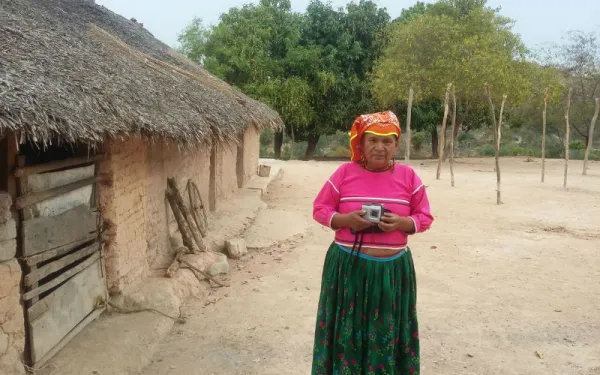
Marcelina, the voice of the San Pedro Mezquital
At 57 years old, Marcelina López has a very active life. She sews her own clothes, makes beautiful jewelry, raises chickens, sells eggs, cooks, is a midwife and organizes the women of her community; all while faithfully conserving her traditions, those of the indigenous Wixárika people. Perhaps what distinguishes Marcelina most is her great character and conviction, qualities that have rooted her deeply in a grand cause: the defense of Mexico’s San Pedro Mezquital River, threatened by Las Cruces Dam. At AIDA we’re deeply moved by the commitment of Marcelina and honored to be part of the same fight. Just like her, we want the San Pedro—the only free-flowing river left in the western Sierra Madre Mountains—to run free. We’ve been inspired to know more about this incredible woman, and to understand why she does what she does. Colors of the Sierra Madre Marcelina lives in a house made of mud, built high upon a hill, in a small community in the state of Nayarit. To go anywhere from her house, she has to walk an hour and a half through the mountains. She travels everywhere on foot. There’s no doubt Marcelina is a special woman. Everyone in the region knows her; she is unmistakable. She has the look of a wise indigenous woman, the bright colors of her clothes equal only to those of the beaded necklaces she wears each day. She herself colors the beads; they are a symbol of the importance of her culture. She often wears a head wrap, which gives her an air of certainty and connotes rich ancestral wisdom. Though her profound presence can seem serious, Marcelina is a very sweet and loving person. Over the years, Marcelina has not been immune to violence and machismo, in its many expressions. She has had to fight to have her voice recognized in agrarian assemblies, and, for a time, had to provide for her children as a single mother. Her people, the Wixárika—known in Spanish as the Huicholes—are a majority group in Nayarit. They live in the western central region of Mexico, in the Sierra Madre Mountains; they primarily populate the states of Nayarit and Jalisco, but are also represented in parts of Durange and Zacatecas. In their native tongue, belonging to the family of Uto-Aztecan languages, wixárika means “people.” For the Wixárika, ceremonies are fundamental to the social wellbeing of the group. It is through these sacred rituals that they ask for rain, give thanks for the harvest, bless its fruits, and pray for health and vitality. Their ceremonies are, in short, where they celebrate and honor life. For Marcelina and her people, the San Pedro Mezquital is the pillar of social, spiritual and economic life. Its waters support their subsistence farming and fishing activities; 14 of their sacred sites are spread along its length. What’s more, the river feeds Marismas Nacionales, one of the most important mangrove forests in all of Mexico. This important source of life and culture is threatened now by the construction of Las Cruces Dam, a project being proposed by the Federal Electricity Commission. The megaproject would be located 65 kilometers north of the city of Tepic. It would have a capacity of 240 MW, divided between three generators. The dam would effectively stand as a 188-meter high concrete curtain. Speaking for the river In her excellent Spanish, accented with clear links to her indigenous roots, Marcelina has on various occasions stood before microphones and cameras to defend the San Pedro River and the lives of those who depend upon it. “The construction of this dam will have a severe impact on our culture and our spirituality. Many of our ceremonial centers are located along this river,” she explained. “It is there that we leave our offerings of thanks; it there that we pray, not just for our own community, but for the entire world.” When asked why she decided to be part of the movement in defense of the San Pedro, Marcelina responded: “As an indigenous women, I’m hurt that they want to take away our river. What’s happening? Why didn’t they consult us indigenous people [about the project]? Where is their respect? Why are we treated this way?” Her questions remain unanswered. The construction of Las Cruces will have negative impacts on the land, its natural resources, and the way of life of the indigenous people who depend upon it. The dam will flood 4,506 hectares; the town of San Blasito, sections of communal land, at least 14 sacred sites, and one ceremonial center, will all be under water. “We are the roots of Mexico,” Marcelina concluded. “It’s not easy for us to change our sacred sites; they’re like a tree rooted deep in the soil. Down these rivers run the blood of our gods.”
Read more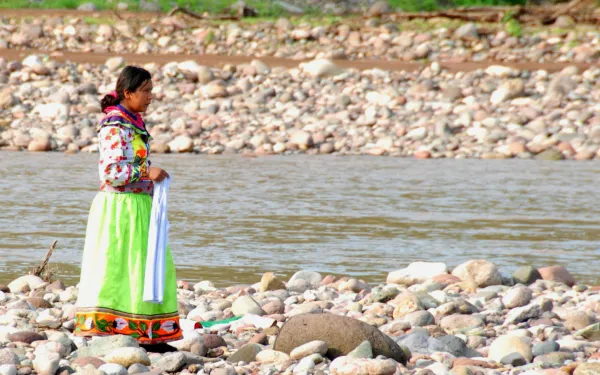
Indigenous groups ask Pope Francis to help stop Las Cruces Dam
In a letter delivered to Vatican representatives, indigenous and riverine communities affected by the construction of a dam on Río San Pedro Mezquital asked that the Pope intercede on their behalf before the Mexican government during his visit to the country. They explained that the hydroelectric project would cause serious harm to the environment and human rights. Mexico City, Mexico. On the occasion of Pope Francis’ visit to Mexico, indigenous and riverine communities from Nayarit state wrote a letter asking the Pope to intercede on their behalf before the Mexican government, in hopes of putting a stop to the Las Cruces Dam project on Río San Pedro Mezquital. The project, they explain, puts at risk their culture and way of life, and also threatens Marismas Nacionales, one of the country’s most important wetlands. The letter was delivered to the local headquarters of the Apostolic Nunciature, a diplomatic mission of the Vatican. It reads: … We respectfully solicit that you, Your Holiness, during your visit to our country, intercede on our behalf before President Enrique Peña Nieto, so that his Government stops the human rights violations of all indigenous communities in the name of development, and that it abandon further advancement of the Las Cruces hydroelectric dam because of the human and environmental impacts it will cause. Mexico’s Secretary of the Environment and Renewable Natural Resources (SEMARNAT) has granted environmental permits and water rights for the construction and operation of the dam. “They did so without having guaranteed the right to prior consultation of the indigenous communities affected by the project, which include the Náyeri, Wixárica, Mexicanero and Tepehuano peoples,” explained Sandra Moguel, AIDA attorney. “SEMARNAT authorized the project with the condition that the Secretariat of Energy realize a process of consultation with the indigenous communities, which should have been done before issuing the authorizations.” In their letter, the indigenous communities honor and celebrate Pope Francis’ encyclical, Laudato Sí, in which he recognizes the important contribution indigenous communities can make towards the promotion and protection of culture and natural resources. “The Río San Pedro is not simply part of our lives, but also fundamental to our spirituality,” explained Julián López Cánare, member of the Náyeri Indigenous Council, who delivered the letter. “All of its territory, from its headwaters to its mouth, is a sacred space where we strengthen our identity and values.” This river also feeds Marismas Nacionales, one of Mexico’s most important wetlands. The area is recognized as a Biosphere Reserve and a Wetland of International Importance under the Ramsar Convention, an intergovernmental treaty for the protection of wetland ecosystems. Finally, the indigenous communities explained in their letter that the pressure put on them to agree to the project has escalated to include harassment and illegal detentions by the government. They also cite instances of acts simulating consultation, which would not be valid considering the project has already been authorized. Citing the visions for the future they share with Pope Francis, the letter finished: Your Holiness, hopeful in the power of your intercession, we part here with the passionate hope that your encyclical letter, Laudato Si’, inspires and propels profound changes in politics, practices, and beliefs of governments, businesses, civil society, and the mentality of our fellow man, with hopes of constructing a more just, more humane, and truly sustainable world.
Read more